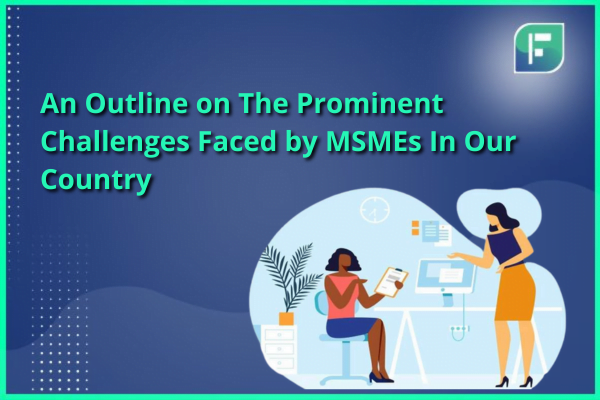The MSME sector plays a vital role in boosting the Indian economy, acting as a dynamic force for growth while tackling two major hurdles: poverty and unemployment. However, despite its effectiveness, Micro, Small, and Medium Enterprises encounter a set of issues and hurdles that impede their progress. As drivers of growth in the Indian economy, these MSMEs have come a long way ever since the Indian government took the initiative of setting up and boosting the growth of these enterprises. In this blog, we shall see the challenges faced by MSMEs in India.
Significance of MSMEs in Contributing to GDP
MSME registration plays a vital role in shaping a nation’s Gross Domestic Product. Their impact on the economic framework is undeniable, primarily by generating employment opportunities and meeting both domestic and international demand. The MSME sector is predominantly led by micro-enterprises. Presently, India boasts around 6.33 crore MSMEs, with an astonishing 6.30 crore of them functioning as micro-enterprises.
Challenges Faced by MSMEs and Remedial Measures
MSMEs are integral to a nation’s economic growth, but there are several challenges faced by MSMEs that impede their true potential. These are:
1. Inadequate Access to Latest Technology
One of the major challenges faced by MSMEs is that MSMEs often lack access to the latest technological advancements, leading to a knowledge and skill gap, especially in rural areas. This hinders their competitiveness and quality standards.
Measures Taken: Zero Defect and Zero Effect
The government initiated the “Zero Defect and Zero Effect” (ZED) program in collaboration with the Ministry of MSME and Quality Council of India. It aims to foster a culture of Zero Defect Manufacturing among MSMEs by offering ZED certification and financial support for technological upgrades.
2. Unavailability of Credit
MSMEs struggle to secure affordable and timely credit, impacting their expansion and long-term growth, exacerbated by the COVID-19 pandemic, which depleted their resources.
Measures Taken: Schemes Under Atmanirbhar Bharat Abhiyan
The government launched several schemes under the Atmanirbhar Bharat Abhiyan to address the credit crunch and help MSMEs recover from the pandemic-induced financial crisis.
3. Procurement of Raw Materials
Limited financial resources are one of the major challenges faced by MSMEs that force many MSMEs to procure low-quality raw materials from local sources, hampering their product quality and competitiveness.
Measures Taken: Raw Material Assistance Scheme
The Indian Government, in collaboration with the National Small Industries Corporation introduced the “Raw Material Assistance Scheme” to provide financial credit for the purchase of both indigenous and imported raw materials.
4. Scarcity of Adequate Infrastructure Resources
Inadequate infrastructure facilities, including skilled manpower, electricity, and basic resources, hinder the productivity and competitiveness of MSMEs, whether they operate in urban or rural areas or industrial estates.
Measures Taken: Establishing Common Facility Centres (CFCs)
The Ministry of MSMEs has introduced a collective approach to enhance technology, market access, and skill development by establishing Common Facility Centres (CFCs) for testing, training, raw material storage, and more.
5. Absence of Skilled Manpower
Despite India’s abundant human resources, one of the major challenges faced by MSMEs is that they struggle to find skilled individuals to improve the quality and quantity of their manufacturing operations.
Measures Taken: Skill Mapping
The Indian Government, in conjunction with the Ministry of MSMEs, initiated “Skill Mapping” to identify skilled individuals. District-wise skill development requirements have been formulated to address this issue.
6. Poor Access to Potential Markets
One of the major challenges faced by MSMEs is capital constraints and a lack of marketing tools which hinder MSMEs’ access to potential markets, limiting their ability to sell to government agencies and expanding their market reach.
Measures Taken: Marketing Promotion Schemes
The Ministry of MSMEs has launched Marketing Promotion Schemes, which include awareness programs, trade fairs, and online service promotion to educate and support existing MSMEs, facilitating their market access.
Prospects for Stimulating MSME Growth in India
There are various ways to strengthen the growth of MSMEs, which include:
Government Initiatives to Promote MSME Growth
To facilitate the growth of MSMEs in India, the government must implement strategic measures. One of the pivotal steps is harnessing domestic manufacturing capabilities through public projects and procurements. Ongoing initiatives like Sagarmala and Bharatmala aim to bridge the urban-rural divide and foster industrial sector expansion.
Government-Industry-Academia Collaboration
In the current economic sector, fostering collaboration between the government, industry, and academia is imperative. Such synergy is essential to identify evolving manufacturing needs and bolster the industrial supply chains within the country.
Technological Advancement for MSMEs
Embracing advanced technology is a viable solution to overcome the existing challenges. The Government of India has recognised the significance of technological development for Indian MSMEs, especially to enhance competitiveness in the global market.
Addressing Key Challenges
In addition to technological advancement, the government should address other critical challenges that impede MSME growth. A holistic approach is required to accelerate the progress of this vital sector.
Final Thoughts
The growth and vitality of India’s MSMEs play a major role in the country’s economic progress. The government’s commitment to making the most of public projects, narrowing the gap between urban and rural areas, and fostering cooperation between government, industry, and academia promises a brighter future. Embracing advanced technology is also a must to boost competitiveness worldwide. But technology is just part of the puzzle.
Overcoming other hurdles, like access to loans, obtaining raw materials, building infrastructure, and enhancing skills, is equally vital. By addressing all these challenges faced by MSMEs comprehensively, the Indian government can strengthen the MSME sector. This, in turn, will help it thrive, make substantial economic contributions, and compete effectively in the global market, ensuring a more prosperous future for the nation.






